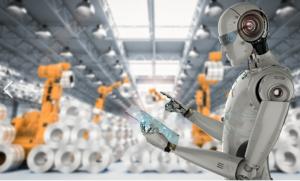
AI-Powered Industry Transformation: Enhancing Productivity, Quality, and Client Service
In today's rapidly evolving technological landscape, Artificial Intelligence (AI) takes center stage, reshaping industries and revolutionizing processes. One of the most significant areas where AI is making a profound impact is in industry digitization and process automation. This article explores how AI, in the form of robotics, humanoids, and Large Language Models (LLMs), can enhance productivity, quality, and service for clients while transforming traditional business operations.
Manufacturing has been one of the early adopters of AI-driven automation. Robots equipped with AI algorithms are being deployed on factory floors to perform tasks that were once labor-intensive and repetitive. These AI-powered machines can work 24/7 without fatigue, ensuring consistent quality and efficiency in production processes.
For instance, in the automotive industry, robots powered by AI are responsible for assembling complex components with precision. They can adapt to changes in the manufacturing process, making it easier to introduce new products and customization. This flexibility not only improves productivity but also allows manufacturers to respond quickly to customer demands.
In the service industry, humanoid robots are transforming customer interactions. These robots can engage with clients in a natural and friendly manner, enhancing the overall experience. For example, hotels and restaurants are employing humanoid robots as concierges and servers, providing personalized services and recommendations. Humanoids equipped with AI can understand and respond to customer inquiries, ensuring efficient and courteous service round the clock. This not only improves customer satisfaction but also allows human employees to focus on more complex and value-added tasks.
Large Language Models (LLMs) like GPT-3 are proving to be game-changers in data analysis and decision-making. These models can process vast amounts of textual and numerical data, extracting valuable insights and patterns that might be overlooked by human analysts. In industries like finance, LLMs are used for sentiment analysis, risk assessment, and market predictions. They can analyze market trends, news articles, and social media data to provide real-time insights, helping businesses make informed decisions and stay competitive.
The application of AI in industry digitization and process automation brings several benefits to businesses and their clients: Improved Productivity: AI-powered robots and automation systems can work faster and more efficiently than humans, leading to increased production rates and reduced operational costs. Enhanced Quality: Automation ensures consistent quality control, minimizing errors and defects in products and services. This translates to higher customer satisfaction and loyalty. Personalized Service: Humanoid robots and AI-driven chatbots can provide personalized recommendations and assistance to clients, enhancing their experience and fostering brand loyalty. Cost Savings: By automating repetitive tasks and optimizing processes, businesses can lower their operational expenses, which can lead to cost savings that can be passed on to clients or reinvested in innovation. Competitive Advantage: Embracing AI in industry digitization positions businesses at the forefront of technological advancement, giving them a competitive edge in their respective markets.
However, it is essential to address the ethical and environmental considerations associated with AI adoption. Environmental Sustainability: While AI enhances productivity, its energy consumption can be a concern. Businesses must balance AI's growth with energy-efficient practices to minimize its environmental footprint. Responsible AI: The development and deployment of AI systems must adhere to ethical guidelines to avoid bias, discrimination, and privacy breaches. Ensuring that AI benefits all stakeholders, including marginalized communities, is imperative.
In conclusion, AI-driven industry digitization and process automation hold immense potential for enhancing productivity, quality, and service for clients. By responsibly harnessing the power of AI in robotics, humanoids, and LLMs, businesses can pave the way for a more efficient and sustainable future while delivering exceptional value to their clients.
